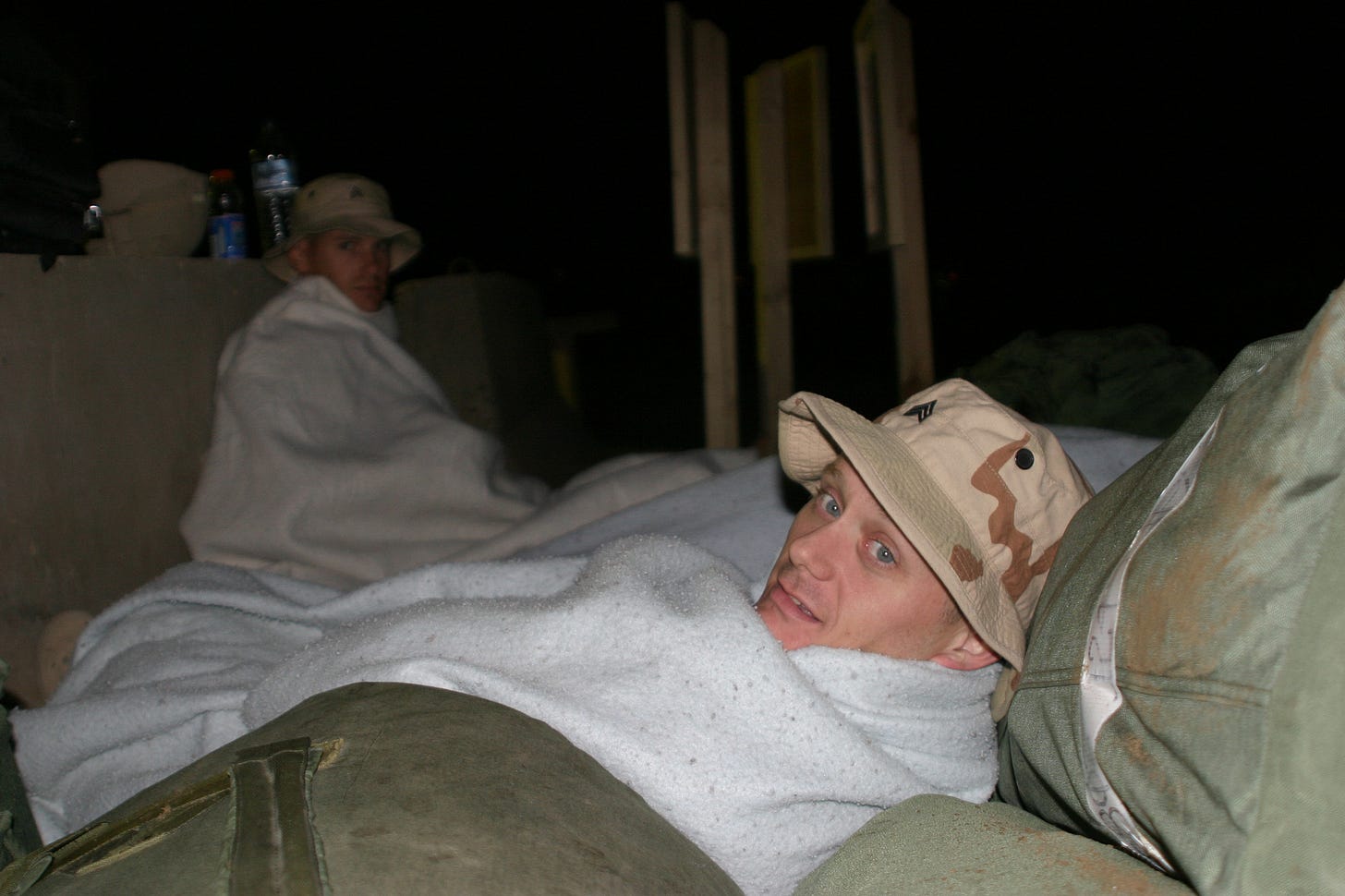Chronic pain and mental health
The psychology of hurting all the time
I have been in constant pain for more than a decade. It started in the harsh landscape of Kuwaiti desert. My National Guard unit was mobilized to Baghdad to participate in the occupation of Iraq. Nowhere, Kuwait, was our last stop prior to entering the war zone. As a military journalist, I was tasked with carrying a lot of heavy broadcast and news gathering gear. Pulling a box that weighed far more than I did through desert sands in 40-mph winds proved fateful.
I ripped something in my spinal column. But we had a war to fight. I pushed through the pain. I embraced the suck. I ignored my injury even though my unit members told me I looked pale and deathly. I took Motrin and limped my way through a year of mortars, rockets, IEDs and VBIEDs. I did my job of spreading all the good news that Iraq was now being Westernized. Right.
Pain, depression, and anxiety travel through similar pathways along your nervous system and share many of the same biological mechanisms. One of the areas in the brain that receives pain signals — specifically, the limbic region — shares many of the same messengers as the mood signals. We know from research studies using neuroimaging that the parts of the brain controlling emotion and sensory features of pain are altered in people with chronic pain.1
The price is that I am always in pain, and likely will be for the rest of my life. A few years ago I could no longer function, and I asked for help from the VA. The medical team assigned to my case diagnosed me with chronic pain syndrome, which is to say, persistent pain that lasts more than three months. My chronic pain has lasted 19 years and will only get worse. Scar tissue, arthritis, and degenerative disc disease. Neuropathy into both my legs. Sometimes I can feel my toes. Sometimes I cannot. Sometimes an electric current charges down my legs and into my feet. My left foot often curls up and refuses to function correctly.
The medications I am on help. Not enough, but some.
Almost everyone has experienced some type of acute, or temporary, pain in their lives. Acute pain is a protective response to tissue injury that typically resolves with the healing process and lasts less than three months. However, for one in five people around the world, their pain persists for longer than three months and is considered chronic.,
Some people may suffer from diseases or disorders that cause their chronic pain, while others may have an injury or accident that causes long-term or permanent pain. Regardless of its source, chronic pain can disrupt nearly all aspects of someone’s life – beyond physical pain, it can impede their ability to work and participate in social and other activities like they used to, impact their relationships and cause feelings of isolation, frustration and anxiety.2
Isolation, frustration, and anxiety do not begin to describe what happened to me before treatment. I found myself unable to work and in a state of near agoraphobia. Listless, lifeless, low-energy, and laconic. That would describe me after Iraq. Spending time in Afghanistan a few years later only made things worse.
That old saying that what doesn’t kill you makes you stronger is nonsense. What doesn’t kill you often diminishes you. Sometimes for the rest of you.
I did not know what chronic pain syndrome was before being diagnosed. Military culture dictates a psychological baseline that is Stoic in the extreme. Pain is something to be proud of, something to celebrate internally and never complain about out loud. Doing so is likely to result in being labeled a shitbird, malingerer, or Blue Falcon (buddy fucker).
Constant long-term pain comes with psychological parameters. My undiagnosed condition contributed to the ending of my first marriage. It caused me to withdraw from many activities I had enjoyed, like triathlons, recreational shooting, and all of my social outings. I lost friends and family members to the mental and emotional consequences of hurting all day every day.
My mental health wasn’t great after a year in Iraq, but the pain exacerbated the cost of living in a war zone and being constantly bombarded with the absolute fragility of my own mortality. My condition deteriorated. Panic attacks and muscle spasms became my constant companions.
The hardest part of my chronic pain syndrome diagnoses and treatment plan was breaking through the culture of silence my military service instilled in me. Once I was able to admit to myself that I had become broken, I could begin to think about asking for and receiving help. There are at least 12 million adults in the US who share my co-occuring conditions of chronic pain and anxiety/depression.
In the years since my initial admission that I needed some help to continue on with my life I have engaged in:
Cognitive behavioral therapy
Psychiatric medications
Physical therapy
Acupuncture
Pain management clinics
Chiropractic
Deep tissue massage
None of these has cured my chronic pain, but all of them have given me a new framework from which I can “embrace the suck” with a different approach. I have been holding down a job, I write as time permits, and most of all, I am able to sustain meaningful relationships, something I truly missed when my physical and mental dysfunctions from military service were at their peak.
My pain is both in my body and in my head. For a long time, I let the pain run the show. Until I no longer wanted to be alive. That place of numb uncaring eventually became unbearable. I had to ask for help or stop living. I chose the first one.
This Substack is called Evolving Together because I believe those of us who are not actively seeking growth opportunities are slowly shrinking into nothing. Life is too short to waste by shrinking. Thank you for being here, and for hearing a piece of my story.
If you know a veteran who does not know how to ask for help, please send them my way. I will bend over backwards to pay it forward.
Sources and footnotes:
https://healthsciences.arizona.edu/news/releases/study-finds-large-gaps-mental-health-care-people-chronic-pain
https://www.mayoclinic.org/drugs-supplements/duloxetine-oral-route/side-effects/drg-20067247
https://deploymentpsych.org/blog/staff-perspective-connecting-clinically-“suck-it-and-drive-”-mentality
https://my.clevelandclinic.org/health/diseases/4798-chronic-pain
https://healthsciences.arizona.edu/news/releases/study-shows-millions-people-live-co-occuring-chronic-pain-and-mental-health-symptoms
https://www.health.harvard.edu/blog/im-in-pain-so-why-is-my-doctor-suggesting-a-psychologist-2019081417450
https://www.pfizer.com/news/articles/a_picture_of_pain_what_life_is_really_like_with_chronic_pain






Although I haven’t been in a war zone I too suffer from chronic pain. I am in many different medications and they do help, at least enough to want to live. I have tried all of the same things you have and many more. I think because none of us have found a cure we always feel like failures. I’m always hoping to find something to “cure” this burden and I can go back to having a normal life. Unfortunately it doesn’t happen. Because pain itself is invisible you get treated differently, my own father hurls abuse at me every time I talk to him or visit him. To him my pain and disability is a moral failing. I go on because there are some things that are enjoyable and I always hope I can do a little something to make the world a better place or make another human being feel a little bit better. That keeps me going.
Pen, I too suffer from back pain. Nothing close to your experience. But enough that I can try to imagine how life altering your affliction is. The back is a delicate structure. Based on the experiences you have described, it's a wonder you are still with us. I am glad you are. Your writing always stirs something in me. Perhaps it's your general world view...or the fact that you are "dog person" :)
Anyway, keep writing. It has great value.